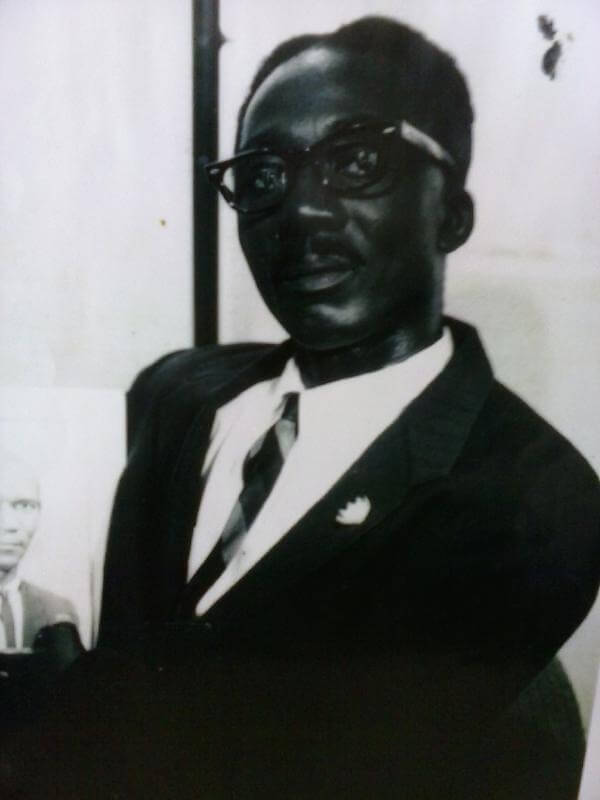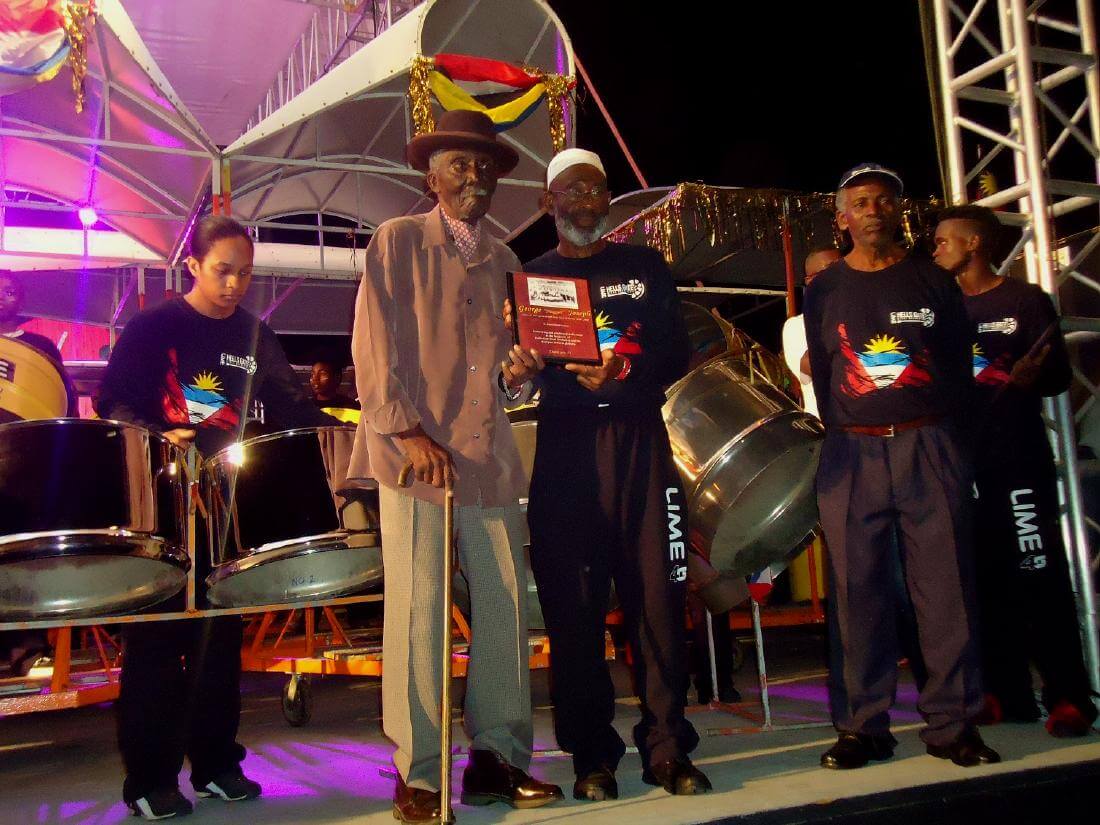
George “Nugget” Joseph - 1995 HGSO 50th Anniversary - Interpretation Centre
Brief Steelpan Bio
George “Nugget” Joseph, a centurion, is the patriarch of the Antigua and Barbuda steel pan movement.
“Nugget,” as he was popularly known and referred to, is a pioneer of the steel pan movement of Antigua and Barbuda and a founding member of the Hells Gate Steel Orchestra (HGSO) (the world’s oldest steel orchestra), whose birthplace and home is in “The Point.” Hells Gate Steel Band began as an organized ‘Iron Band’ in 1945 and the steelpan was introduced in 1946. However, the “essential steel” (rhythm instrument), to date, remains an integral part of the steel orchestra, though far less in quantity than in the iron band.

George “Nugget” Joseph
“Nugget” served as the secretary and treasurer of the Hells Gate Steel Band from its inception in 1945 until 1958. Effective 1948 to 1958, he served as captain and secretary treasurer.
“Nugget” was present when the name Hells Gate was chosen and confirmed that it was Eustace “Manning” Henry, who suggested that name, after brain-storming for a name by the other members.
“Nugget” was a treble pan player for Hells Gate Steel Orchestra. However, because of the stigma and very negative press (coming from the then-aristocrats and affluent blacks) against the steel pan and people involved in the steel pan movement in the early years, “Nugget,” in addition to his functions as Captain and Secretary/Treasurer, took on the responsibility of responding to all negative press, that was published in the Antigua Star News Paper. He responded via the Antigua Star and the Workers’ Voice Newspapers. Also, he did not own or had the luxury of a typewriter. Hence, his responses were all hand written where ever he could access light at nights. His discreet and effective responses brought about a change of attitude from the naysayers. In fact, many came to appreciate the steel pan artform and volunteered to assist the steel bands in the various communities. According to “Nugget’s” transcript, “Governor Baldwin was criticized and despised by many, because of his affinity to the steel bands and to the common man.” While some articles referred to the pan men and revellers as hooligans, vagabonds and riff-raffs, one article associated the performances of steel band and the dancers with paganism. In “Nugget’s” response, he wrote, “if the steel band had originated at the corners of Market and St. Mary’s Streets, - what then. He was of the view, that for decades there existed both a stigma and a myth which have enveloped “The Point” and its people. The stigma is that you can get a boy out of “The Point” but you can’t get “The Point” out of the boy and the myth is that nothing good has ever come out of “The Point.” “Nugget” in one of his responses, referred to one of the naysayers as, “an antagonistic termite to progress.”
One very close associate of “Nugget,” George “Son-Son” Benjamin, once asked him, “Nugget when do you intend to stop replying to that trash that these people write about the steel band?” “Nugget” replied, “Sonny as long as these people keep on writing I shall keep on responding.” He continued, “with all seriousness, I firmly believe that these individuals are not attacking the steel band (per-se). But indirectly they are maligning the birth-place of Antigua steel band, “The Point,” and the people who gave birth to that art in Antigua.” “Nugget” went on to remark that, none of the critics had ever placed their foot in “The Point.” “Nugget’s” single-handed literary battle with the early critics of the steelpan movement, resulted in respect gained, the acceptance of the art form and the involvement of people of all walks of life in the steelpan movement, today.
“Nugget” must be commended for his great wisdom exhibited. Rather than choosing his sword to be his sermon, he chose his pen to be his sermon.
“Nugget” was present when the first steelpan came to Antigua from Trinidad during the second world war. It was brought to Antigua by the late Son Martin, who was a sailor aboard the ‘War Risk,’ which was owned by the Destin Brothers. The War Risk made several voyages between Antigua and Trinidad during the second world war. The second steelpan was brought to Antigua from Trinidad by the late Malcolm “Cowie” Joseph, who was also a sailor on the War Risk. That steelpan was delivered to “Nugget” in person. The third steelpan was brought to Antigua from Trinidad by Buster Carty after the second world war ended and upon his return to Antigua. During the second world war, Buster Carty was with the Leeward Islands Battalion fighting North Africa during the Tunisian Campaign.
In 1949, “Nugget” was captain of Hells Gate Steel Orchestra, when it won the first ever national steel band competition (Panorama), which was sponsored by the then-Governor, Governor Baldwin, Earl of Bwedley and held at the former Government Girls School. The Antigua 1949 national steel band competition (Panorama), preceded Trinidad’s first ever national steel band competition (Panorama), by fourteen (14) years.

(l-r) George “Nugget” Joseph (with cane), Stafford “Stove” Joseph & Eustace Manning Henry - Panorama 2014
In 1950, “Nugget” was instrumental in organizing and preparing Hells Gate Steel Orchestra for its first church performance at the St. Peters Anglican Church in Parham Town.
In May and August of 1950, “Nugget” led Hells Gate on tours to St. Kitts. On returning to Antigua at the end of the August tour, the boat docked up at the harbour in the middle of the 1950 hurricane. The band members and other passengers had to hurry, wading through water, knee high to get to safety.
In 1951, “Nugget” led Hells Steel Orchestra on a tour to Tortola (BVI), St. Thomas and St. Croix (USVI). William Jeffrey, an Antiguan who resided in Tortola, was instrumental in organizing the tour.
In the early 1950s, under the captaincy of “Nugget,” Hells Gate Steel Orchestra participated in a successful Easter Monday boycott of Moody Stuart’s annual horse racing event. It was organized by the Rt. Hon. Sir Vere Cornwall Bird Sr., then the Chief Minister of Antigua and Barbuda. V.C. Bird Sr., organized a well-planned picnic at Ffryes Bay. Hells Gate Steel Orchestra, Red Army Steel Orchestra and Brute Force Steel Orchestra and were present to entertain the massive crowd.
In 1952, subsequent to the first-ever recording of the steel pan on wax, “Nugget” and Ivan “Jim Jones” Edwards, (the first President) of Hells Gate Steel Orchestra, undauntedly and successfully negotiated with Emory Cooke (the producer and recording engineer), for an advance payment of USD $500.00. Mr. Cooke had previously promised to give royalties to the three bands which he recorded, after the recordings were released and sales generated. Brute Force Steel Orchestra and North Stars Steel Orchestra accepted that arrangement. Hells Gate did not.

Seated: center - George “Nugget” Joseph; Reginald “Reggie” Henry (l); Eustace Manning Henry (r)
Standing: (l-r) - Stafford “Stove” Joseph; Orville Henry; Robert Bobby Simmons; Veron Henry
In 1952, subsequent to being officially invited, “Nugget” led Hells Gate Steel Orchestra to St. Thomas (Carnival) and St. Croix (Christmas Festival Celebration). On their return to Antigua, “Nugget” and Ivan “Jim Jones” Edwards on behalf of the orchestra, sought an audience with the principals of the Antigua and Barbuda Tourism Bureau to inform the Bureau of the orchestra’s experience of carnival in St. Thomas and St. Croix and to suggest to the relevant authority that Antigua and Barbuda consider a similar event. The orchestra thought that having such a festival, would reap cultural, social and economic benefits for Antigua and Barbuda. The Bureau afforded “Nugget” and Ivan “Jim Jones” Edwards the opportunity to meet but rebuffed them. As “Nugget” simply put it, “the authority saw us as nobodies. What do steel band people know about economics?” Hence, the idea of carnival was brought to Antigua by the early members of the Hells Gate Steel Orchestra,
In 1952, “Nugget” led Hells Gate Steel Orchestra in a solidarity march organized by the Antigua Trades and Labour Union, in support of Douglas Kem Roberts, then the Union’s First Vice-President. He was dismissed by Dews for not returning to work half an hour after completing jury duty. Hells Gate led the masses to Governor Baldwin at Government House where they requested of him to settle the dispute.
In 1954, Hells Gate Steel Orchestra led by “Nugget,” along with Brute Force Steel Orchestra and Red Army Steel Orchestra, took part in a historic demonstration with the ‘grassroot’ [sic] natives of Antigua/Barbuda. The English Cricket team was visiting for the first time and Len Hutton, (the English batsman whose record (364 runs not out) was later broken by Sir Garfield Sobers) and who was hailed the world’s best bats man, was included in the English team to play against the Leeward Islands team. Hubert Anthonyson, an Antiguan who was hailed as the fastest bowler in the Leeward Islands was not selected. The excuse by the selectors was that he was unfit to play due to a bad knee. Bramble from Montserrat was selected to replace Anthonyson. It was the popular belief of many, that the selectors were fearful of having Anthonyson bowling at Hutton and hitting him. The masses took to the streets. Governor Blackburn (successor to Governor Baldwin) was not pleased with Hells Gate’s participation in the demonstration, so he distanced himself from them for a while.
During “Nugget’s” tenure, the first tutor of the Hells Gate Steel Orchestra was Dave Louvouski. Louvouski, an accomplished musician, was the Spring Gardens Moravian Church organist. Bertha Higgins was the second accomplished musician to tutor Hells Gate Steel Orchestra.
“Nugget” migrated to the United States Virgin Islands in the 1960s, but Antigua remained in his heart. Whenever he got the opportunity to talk about steel bands, he immediately became energized. He was endowed with tremendous amount of information on just about any subject. He told it as it was, regardless of the situation. “Nugget” believed in 'setting the record straight.’
In honour of “Nugget’s” invaluable contribution to the steelpan art form in Antigua and Barbuda, the Government of Antigua and Barbuda in conjunction with the Antigua and Barbuda Steelpan Association, in 2017, named the national Panorama, “The George “Nugget” Joseph National Panorama 2017.”
Indeed, George “Nugget” Joseph, was genuinely dedicated and truly committed to development and preservation of the steelpan art form in Antigua and Barbuda from its inception. Additionally, his remarkable achievement in winning over for the steelpan movement, the hearts of the early critics of the movement, must be recorded in our history. This has had a very positive impact on the steelpan movement today.
Researched, Prepared by, and copyright:
Jessy J
Stafford Joseph
Panthologist
The Hells Gate Steel Orchestra expresses
sincere condolences to the family of
George “Nugget” Joseph (Nov. 1915 -
Aug. 2018), on his peaceful passing.
May he rest in “Pan.”
Leave a comment in the WST forum


